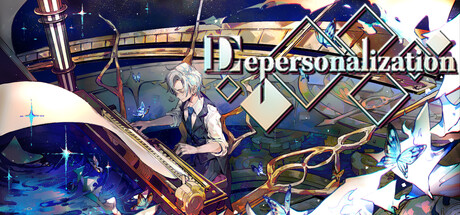Depersonalization isn’t your typical video game. It dives headfirst into the unsettling realm of dissociation, a psychological phenomenon characterized by feelings of detachment from oneself and surroundings. Here, the game isn’t a thrilling adventure or a power fantasy; it’s a deeply personal exploration of a fractured mind.
A Descent into the Fog
The game opens without fanfare, thrusting you into the shoes of an unnamed protagonist. The world feels muted, shrouded in a perpetual gray haze. Buildings appear like blurred monoliths, and faces lack definition. This is your character’s distorted perception, a constant reminder of their disconnect from reality.

Graphics: 6
Sound: 7
Controls: 6
Story: 7
Engaging: 7
Overall: 6.6
Core gameplay revolves around navigating a series of fragmented environments. Some resemble familiar places – a bustling city street, a childhood bedroom – but all are warped reflections, imbued with a sense of unreality. As you progress, the narrative unfolds through fragmented memories, cryptic encounters, and unsettling visual metaphors.

Lost in the Labyrinth of the Mind
The core mechanic is simple: exploration. However, Depersonalization’s brilliance lies in how it utilizes this simplicity to evoke a profound sense of disorientation. Environments are deliberately labyrinthine, with illogical pathways and shifting layouts. Doors lead to unexpected locations, hallways loop back on themselves, and the ground might suddenly vanish beneath your feet. This constant disorientation mirrors the protagonist’s struggle to grasp onto a coherent reality.
A Feast for the Unconscious
Visually, Depersonalization is a masterpiece of unsettling ambience. The muted color palette and blurred textures create a dreamlike quality, emphasizing the protagonist’s distorted perception. Environments are often devoid of detail, forcing you to focus on the overwhelming sense of emptiness. However, subtle details pepper the world – a disembodied hand reaching out from a wall, a distorted reflection in a mirror – that hint at the protagonist’s inner turmoil.
The soundtrack is equally haunting. A dissonant mix of electronic drones and warped classical music creates a constant sense of unease. The soundscapes are punctuated by sudden, jarring noises that represent the protagonist’s intrusive thoughts and anxieties.

More Than Just a Game
Depersonalization is not for the faint of heart. It’s a challenging and emotionally draining experience. The constant sense of disorientation and the exploration of a deeply unsettling topic can be overwhelming at times. However, for those willing to venture into its dark recesses, the game offers a profound and disturbingly accurate portrayal of dissociation.
A Mirror to the Mind
One of the game’s greatest strengths is its ability to personalize the experience. The fragmented environments can be interpreted as specific memories or anxieties unique to each player. This injects a layer of personal reflection, prompting players to confront their own vulnerabilities and anxieties.

A Beacon of Hope in the Fog?
Despite the bleak atmosphere, Depersonalization isn’t entirely devoid of hope. Scattered throughout the world are glowing white fragments. These represent moments of self-awareness, brief glimpses of lucidity amidst the dissociation. Collecting these fragments unlocks journal entries that offer cryptic insights into the protagonist’s past and their journey towards recovery.
The game’s ending is deliberately ambiguous. There’s no clear resolution or cathartic release. However, the act of collecting the white fragments suggests a path towards healing, a reminder that even in the face of dissociation, there’s always the possibility of piecing oneself back together.
Depersonalization: A Challenging Yet Essential Experience
Depersonalization is not a game for everyone. If you’re looking for a lighthearted escape, look elsewhere. However, for those seeking a thought-provoking and emotionally resonant experience, Depersonalization is a must-play. It’s a game that will stay with you long after the credits roll, prompting reflection and challenging your perception of reality.




